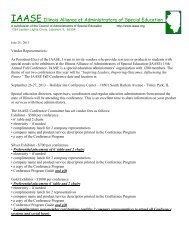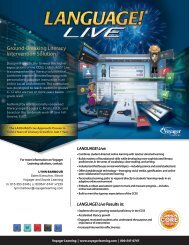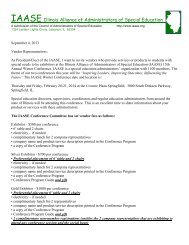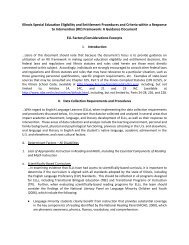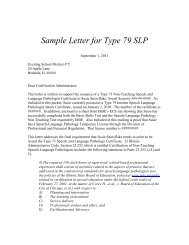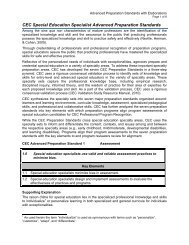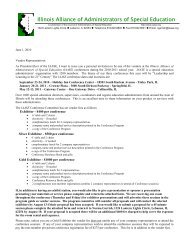Five Words Special Education Directors Fear: “Something ... - IAASE
Five Words Special Education Directors Fear: “Something ... - IAASE
Five Words Special Education Directors Fear: “Something ... - IAASE
Create successful ePaper yourself
Turn your PDF publications into a flip-book with our unique Google optimized e-Paper software.
2. “In other words, when a disabled student’s transportation needs can be met on a<br />
regular education school bus, the student should ride the regular education bus<br />
rather than be placed on a special education bus.” See Kenai Peninsula (AK)<br />
Borough Sch. Dist., 20 IDELR 673 (OCR 1993).<br />
E. North Penn School District, 109 LRP 62301 (SEA Penn. 2009)<br />
1. 13-year-old 7th grade student diagnosed with a severe seizure disorder. She<br />
required air conditioned transportation, so she was transported alone (with her<br />
1:1 nurse) on a “small” special education bus. Parents wanted their daughter<br />
transported with her friends on the “large” school bus.<br />
2. In addition to the need for air conditioning (which was not available on the large<br />
bus), the student was prescribed Diastat, which was carried by the nurse at all<br />
times. The school district’s position was that in the event Diastat needed to be<br />
administered on the bus, the smaller bus offered more room and privacy. The<br />
parents disagreed, instead offering a “privacy sheet” to hold in front of the<br />
student if Diastat needed to be administered.<br />
3. The IHO cited Ms. S. ex rel. L.S. v. Scarborough Sch. Committee, 42 IDELR 117<br />
(D. Me. 2004), which concluded that the regulations were unclear as to whether<br />
the IDEA’s LRE mandate applied to transportation: “it is not at all clear that the<br />
‘least restrictive environment’ requirement of the IDEA applies to<br />
transportation.”<br />
4. The IHO ruled in favor of the school district: “[I]t presents a riddle to this<br />
hearing officer to contemplate that [the student] reportedly would not mind<br />
having a medication inserted into Student’s rectum in the presence of Student’s<br />
peers, with or without a privacy blanket, but would not feel normal riding the<br />
small school bus.”<br />
F. City of Chicago School District 299, 112 LRP 54831 (SEA Ill. 2012)<br />
1. Parent requested that a 20-year-old student with a learning disability be<br />
transported to school in a minivan instead of a large bus. The parent argued that<br />
her son required a minivan to reduce the effects of his anxiety disorder and<br />
motion sickness.<br />
2. The IHO found that there was no evidence that bus rides caused the student's<br />
anxiety, behavior, or decreased instructional time. The bus driver testified that<br />
the student generally went to sleep on rides to school and did not complain of<br />
illness or upset stomach.<br />
6. Are school districts obligated to perform/provide medical services during transportation?<br />
<br />
Yes<br />
A. School districts must consult their state law for guidance in this area. Some states have<br />
strict provisions in this area and heavily regulate what educational background is needed<br />
to perform certain medical procedures.<br />
Page 6 of 22<br />
900934.1



